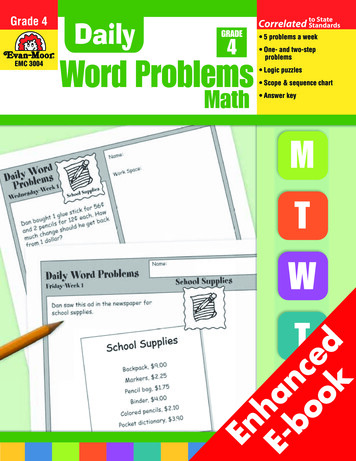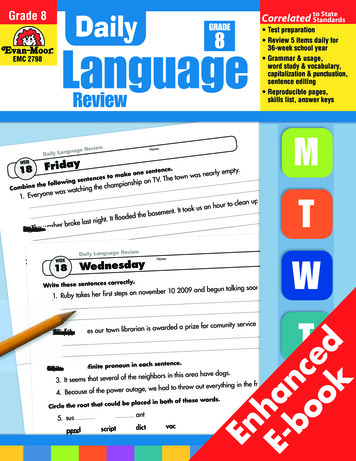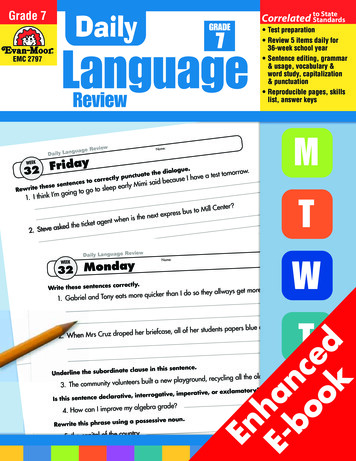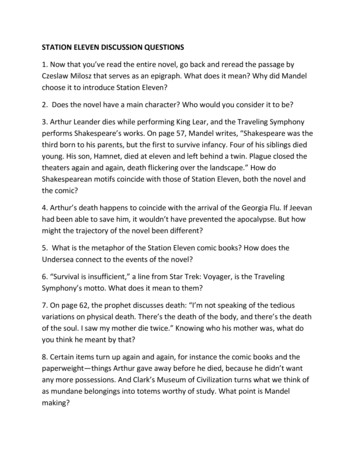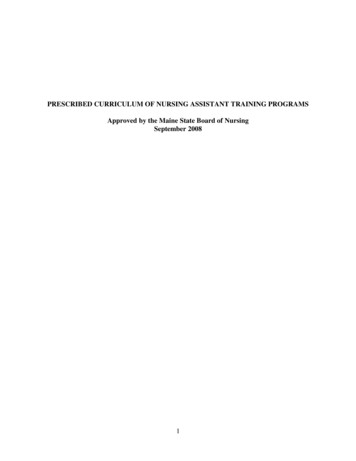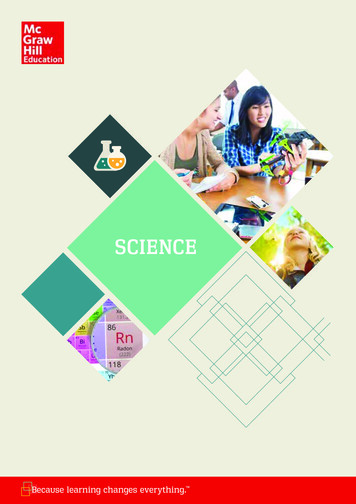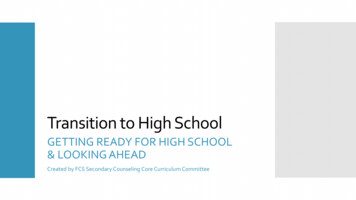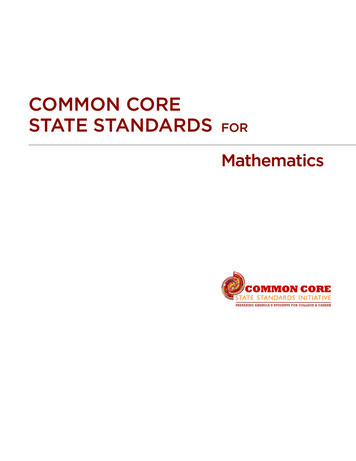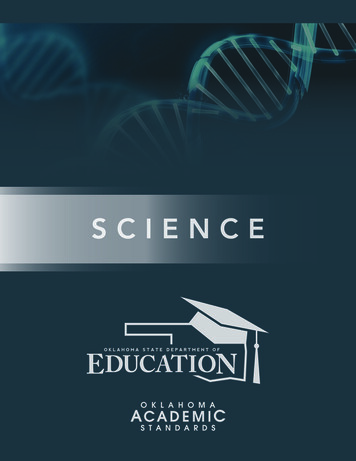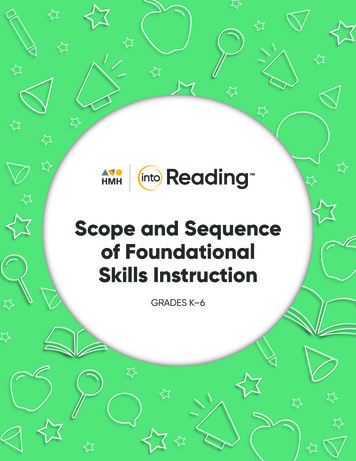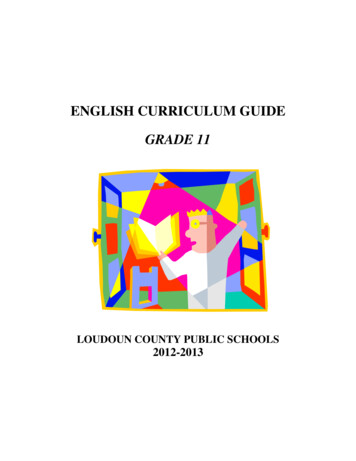
Transcription
ENGLISH CURRICULUM GUIDEGRADE 11LOUDOUN COUNTY PUBLIC SCHOOLS2012-2013
English Leadership TeamRhonda AlleySteve BarhamFreyja BergthorsonLaura BolyardMelanie BuckleyNeelum ChaudhryChris CuozzoCassandra DonahueMeghann DonohuePeggy GearhartShelli GlynnDavid HoffmanColleen MilliganJim NolandShelah NovakShannon O‘NeillMarcia OwensJo Ann PearsonLaura PurvisToni RaderPhil RosenthalFatima SchererHolly SharpKaren SkeesTammy SvitekAllyson WhiteJason WhiteDr. Edgar B. HatrickSuperintendentSharon D. AckermanAssistant Superintendent, InstructionEric L. StewartDirector, Curriculum and InstructionDr. Michele Schmidt MooreSupervisor, English/Language ArtsDavid ArbogastEnglish SpecialistThis document, based on the Virginia Department of Education’s English Standards of LearningCurriculum Framework (2010), provides extensions and additions to form the Loudoun County EnglishCurriculum.
LOUDOUN COUNTY PUBLIC SCHOOLSENGLISH 11 CURRICULUM GUIDECONTENTSMission Statement . 1BMA Pacing Guide & Checklists . 2LCPS and Virginia SOL Requirements . 7Communication Strand . 8Reading Strand . 14Writing Strand . 30Research Strand . 43Vocabulary Strand . 49Sample Unit . 50APPENDIXInternet Safety . 53LCPS Plagiarism Policy . 55LCPS Guidelines for Video/DVD Use, Grades 9-12 .55Ten Things Teachers Should Know about Copyright 56How to Request Permission to Duplicate Copyrighted Materials . 57Critical Perspectives . 58Standardized Test Preparation . 61Resources for Writing and Critical Reading . 69
The LCPS High School English ProgramHigh school English courses provide instruction in oral language, reading and literature, writingand grammar, research, and vocabulary. Students engage in a variety of formal and informalspeech activities. They practice whole-class and independent reading, and teachers provide skillsfor reading fiction and non-fiction. Students engage in analytic, argumentative, research-based,creative, and reflective writing. They also practice timed writings to prepare them forstandardized tests. They master a range of grammar and usage skills. Research instructionemphasizes the ability to analyze, synthesize, evaluate, and document information from a varietyof sources. Vocabulary instruction not only prepares students for PSAT, SAT, and SOL tests, ithelps to develop students‘ reading comprehension and their ability to express themselves orallyand in writing. Teachers focus on the use of context clues to understand unfamiliar words;distinctions between denotation and connotation; and a study of synonyms, antonyms, andhomophones.Grade level courses challenge students to master rigorous standards while providing studentswith individualized support. Academic courses focus on the same content and skills as gradelevel courses but require more independent work. Honors courses are offered in grades 9, 10,and 11. While they focus on the same content and skills as grade level and academic courses,honors courses are distinguished by a more rigorous study of literature. They move at anaccelerated pace, cover a greater breadth and depth of textual study, and require moreindependent work. They also are designed to prepare students to take Advanced PlacementEnglish in their senior year. Accordingly, they emphasize the ability to synthesize informationfrom a variety of sources as they read and write. The honors level final exam is prepared at thedistrict level and mimics the form of an AP test. Students taking honors level courses receive anextra 0.5 weighting in the GPAs.
LCPS English Department Mission StatementHere are six beliefs that we strive to make true for all of our students.Students communicate and collaborate effectively in written and oral discourse in ever-changing, real worldsituations.Therefore, we willdevelop active and involved listenersteach students to self-advocate and ask for clarificationshow students how to use the right language and diction for informal and formal situationsdevelop learning activities that encourage students to communicate in authentic contextsprovide opportunities for collaborative learning in research and other projects.Students think critically.Therefore, we willprovide opportunities to critically analyze language and mediateach processes for critical thinking and making informed decisionsshow students how to refine their arguments based on new information.Students understand and respect multiple perspectives and cultures.Therefore, we willexplore literature that reflects many culturesengage students in multiple perspectives and ideas.Students value and appreciate the power of language through reading and writing.Therefore, we willprovide opportunities for students to choose and engage in relevant and meaningful textsprovide opportunities for students to choose the audience and purpose for their writing.Students take on challenges and reflect on progress.Therefore, we willprovide opportunities for increased rigor in assignmentsprovide frequent opportunities for students to reflect on their growth as communicators.Students are well-versed in technology tools used to help them communicate.Therefore, we willintegrate technology tools in our teaching and in student learning.1
11th Grade Writing Guide and BMA Checklist: Year-longThe Writing Strand is not assessed on either of the Benchmark Assessments; therefore, it is not included on either of the semesterpacing guides. The Writing Diagnostic Test, given in October, is intended to give teachers information about which skills toemphasize throughout the year. It is not expected that teachers will have already covered all of the standards that will be assessedon the Writing Diagnostic Test. Writing Standards should all be covered prior to the SOL Writing Test given in March.However, please note the suggested pacing of writing instruction below. Use the spaces in front of each item to track its coveragethroughout the year.WRITINGStudents should be writing daily for a variety of audiences and purposes. Each 9 week period should, however, include at least onecore unit focusing on a specific kind of writing. The four required modes are listed in capital letters below. They are described morefully in the Writing section of this guide. In addition, throughout the year students should be engaged in Reflective Writing, alsodescribed later in this guide.REQUIRED WRITINGS*ANALYTIC WRITING (1 per semester)ARGUMENTATIVE WRITING (3 per semester)RESEARCHED-BASED WRITING (1 per year)CREATIVE WRITING (1 per semester)REFLECTIVE WRITING (1 per quarter) TIMED WRITING (3 per semester) *The required numbers of required writings refer to final drafts. It is expected that students will be working toward those draftsthroughout the unit. May be done in conjunction with a required writing. May be the first draft of another writing.SKILLS11.6 Write in a variety of forms, with an emphasis on persuasion.a. Generate, gather, plan, and organize ideas for writing to address a specific audience and purpose.b. Produce arguments in writing that develop a thesis that demonstrates knowledgeable judgments, addressescounterclaims, and provides effective conclusions.c. Organize ideas in a sustained and logical manner.d. Clarify and defend position with precise and relevant evidence elaborating ideas clearly and accurately.e. Adapt content, vocabulary, voice, and tone to audience, purpose, and situation.f. Revise writing for clarity of content, accuracy, and depth of information.g. Use computer technology to plan, draft, revise, edit, and publish writing.h. Write and revise correspondence to a standard acceptable both in the workplace and in postsecondaryeducation.11.7 Self- and peer-edit writing for correct grammar, capitalization, punctuation, spelling, sentence structure, andparagraphing.a. Use a style manual, such as that of the Modern Language Association (MLA) or the American PsychologicalAssociation (APA), to apply rules for punctuation and formatting of direct quotations.b. Use verbals and verbal phrases to achieve sentence conciseness and variety.c. Distinguish between active and passive voice.d. Differentiate between in-text citations and works cited on the bibliography page.e. Adjust sentence and paragraph structures for a variety of purposes and audiences.f. Proofread and edit writing for intended audience and purpose.2
11th Grade Pacing Guide and BMA Checklist: 1st SemesterThe Pacing Guide indicates the window for the Benchmark Assessment that will assess the students‘ progress on the standards.However most, if not all, of the standards may be addressed (taught, practiced, reinforced) beyond the Pacing Guide periodindicated.Use the spaces in front of each skill to track its coverage.Note that all Writing Standards are listed on the Grade 11 Year-Long Checklist. They are not tested on either of theBenchmark Assessments. Students should be writing continually throughout the year, though teachers may choose whichmodes of writing to emphasize each quarter.READINGREQUIRED READING11th grade students in LCPS can and should read 6-8 books per quarter. The 2010 Virginia SOL suggest that at least half of these benonfiction. These may include books read independently, in reading groups, and as whole-class novels. While many books will beselected from the Reserved or Supplemental Reading Lists, students should also select independent reading books from the schoollibrary or other sources.AMERICAN LITERATURE11.4 Read, comprehend, and analyze relationships among American literature, history, and culture.a. Describe contributions of different cultures to the development of American literature.b. Compare and contrast the development of American literature in its historical context.c. Discuss American literature as it reflects traditional and contemporary themes, motifs, universal characters and genres.d. Analyze the social or cultural function of American literature.i. Read and analyze a variety of American dramatic selections.j. Analyze the use of literary elements and dramatic conventions including verbal, situational, and dramatic irony used inAmerican literature.k. Generate and respond logically to literal, inferential, evaluative, synthesizing, and critical thinking questions before,during, and after reading texts.SKILLS11.5 Read and analyze a variety of nonfiction texts.c. Generalize ideas from selections to make predictions about other texts.d. Draw conclusions and make inferences on explicit and implied information using textual support.e. Analyze two or more texts addressing the same topic to identify authors‘ purpose and determine how authors reachsimilar or different conclusions and genres.f. Identify false premises in persuasive writing.g. Recognize and analyze use of ambiguity, contradiction, paradox, irony, overstatement, and understatement in text.h. Generate and respond logically to literal, inferential, evaluative, synthesizing, and critical thinking questions before,during, and after reading texts.VOCABULARYFor suggestions on vocabulary instruction, see the LCPS Vocabulary Framework.11.3 Apply knowledge of word origins, derivation, and figurative language to extend vocabulary development inauthentic texts.a. Use structural analysis of roots, affixes, synonyms, antonyms, and cognates to understand complex words.b. Use context, structure, and connotations to determine meanings of words and phrases.c. Discriminate between denotative and connotative meanings and interpret the connotation.d. Identify the meaning of common idioms.e. Identify literary and classical allusions and figurative language in text.Practice PSAT and SAT type questionsCOMMUNICATION/MEDIA LITERACY11.2 Examine how values and points of view are included or excluded and how media influences beliefs and behaviors.a. Use technology and other information tools to organize and display knowledge in ways others can view, use, andassess.b. Use media, visual literacy, and technology skills to create products.c. Evaluate sources including advertisements, editorials, blogs, Web sites, and other media for relationships betweenintent, factual content, and opinion.d. Determine the author‘s purpose and intended effect on the audience for media messages.3
11th Grade Pacing Guide and BMA Checklist: 1st SemesterThe Pacing Guide indicates the window for the Benchmark Assessment that will assess the students‘ progress on the standards.However most, if not all, of the standards may be addressed (taught, practiced, reinforced) beyond the Pacing Guide periodindicated.Use the spaces in front of each skill to track its coverage.Note that all Writing Standards are listed on the Grade 11 Year-Long Checklist. They are not tested on either of theBenchmark Assessments. Students should be writing continually throughout the year, though teachers may choose whichmodes of writing to emphasize each quarter.WRITINGStudents should be writing daily for a variety of audiences and purposes. Each 9 week period should, however, include at least onecore unit focusing on a specific kind of writing. The four required modes are listed in capital letters below. They are described morefully in the Writing section of this guide. In addition, throughout the year students should be engaged in Reflective Writing, alsodescribed later in this guide.REQUIRED WRITINGS*ANALYTIC WRITING (1 per semester)ARGUMENTATIVE WRITING (3 per semester)RESEARCHED-BASED WRITING (1 per year)CREATIVE WRITING (1 per semester)REFLECTIVE WRITING (1 per quarter) TIMED WRITING (3 per semester) *The required numbers of required writings refer to final drafts. It is expected that students will be working toward those draftsthroughout the unit. May be done in conjunction with a required writing. May be the first draft of another writing.RESEARCH11.8 Analyze, evaluate, synthesize, and organize information from a variety of sources.a. Use technology as a tool to research, organize, evaluate, synthesize, and communicate information.d. Critically evaluate the quality, accuracy, and validity of information.e. Make sense of information from diverse sources by identifying misconceptions, main and supporting ideas,conflicting information, point of view, or bias.j. Define the meaning and consequences of plagiarism and follow ethical and legal guidelines for gathering andusing information.Review the Acceptable Use Policy for Internet Use.Discuss Internet safety (see appendix).11th grade students in LCPS must write at least one 4-8 page research paper that analyzes, interprets,synthesizes, and evaluates information each year. See the LCPS Information Literacy Framework formore information on research writing in LCPS.4
11th Grade Pacing Guide and BMA Checklist: 2nd SemesterThe Pacing Guide indicates the window for the Benchmark Assessment that will assess the students‘ progress on the standards.However most, if not all, of the standards may be addressed (taught, practiced, reinforced) beyond the Pacing Guide periodindicated.Use the spaces in front of each skill to track its coverage.Note that all Writing Standards are listed on the Grade 11 Year-Long Checklist. They are not tested on either of theBenchmark Assessments. Students should be writing continually throughout the year, though teachers may choose whichmodes of writing to emphasize each quarter.READINGREQUIRED READING11th grade students in LCPS can and should read 6-8 books per quarter. The 2010 Virginia SOL suggest that at least half of these benonfiction. These may include books read independently, in reading groups, and as whole-class novels. While many books will beselected from the Reserved or Supplemental Reading Lists, students should also select independent reading books from the schoollibrary or other sources.AMERICAN LITERATURE11.4 Read, comprehend, and analyze relationships among American literature, history, and culture.e. Analyze how context and language structures convey an author‘s intent and viewpoint.f. Explain how the sound of a poem (rhyme, rhythm, onomatopoeia, repetition, alliteration, assonance, and parallelism)supports the subject, mood, and theme.g. Explain how imagery and figures of speech appeal to the reader‘s senses and experience.h. Explain how an author‘s specific word choices, syntax, tone, and voice support the author‘s purpose.SKILLS11.5 Read and analyze a variety of nonfiction texts.a. Use information from texts to clarify concepts.b. Read and follow directions to complete an application for college admission, for a scholarship, or for employment.VOCABULARYFor suggestions on vocabulary instruction, see the LCPS Vocabulary Framework.11.3 Apply knowledge of word origins, derivation, and figurative language to extend vocabulary development in authentictexts.f. Extend general and specialized vocabulary through speaking, reading, and writing.g. Use knowledge of the evolution, diversity, and effects of language to comprehend and elaborate the meanings of texts.Practice SAT-type questions.COMMUNICATION/MEDIA LITERACY11.1 Make informative and persuasive presentations (at least one).a. Gather and organize evidence to support a position.b. Present evidence clearly and convincingly.c. Address counterclaims.d. Support and defend ideas in public forums.e. Use grammatically correct language, including vocabulary appropriate to the topic audience, and purpose.f. Monitor listening and use a variety of active listening strategies to make evaluations.g. Use presentation technology.h. Collaborate and report on small-group learning activities5
.11th Grade Pacing Guide and BMA Checklist: 2nd SemesterThe Pacing Guide indicates the window for the Benchmark Assessment that will assess the students‘ progress on the standards.However most, if not all, of the standards may be addressed (taught, practiced, reinforced) beyond the Pacing Guide periodindicated.Use the spaces in front of each skill to track its coverage.Note that all Writing Standards are listed on the Grade 11 Year-Long Checklist. They are not tested on either of theBenchmark Assessments. Students should be writing continually throughout the year, though teachers may choose whichmodes of writing to emphasize each quarter.WRITINGStudents should be writing daily for a variety of audiences and purposes. Each 9 week period should, however, include at least onecore unit focusing on a specific kind of writing. The four required modes are listed in capital letters below. They are described morefully in the Writing section of this guide. In addition, throughout the year students should be engaged in Reflective Writing, alsodescribed later in this guide.REQUIRED WRITINGS*ANALYTIC WRITING (1 per semester)ARGUMENTATIVE WRITING (3 per semester)RESEARCHED-BASED WRITING (1 per year)CREATIVE WRITING (1 per semester)REFLECTIVE WRITING (1 per quarter) TIMED WRITING (3 per semester) *The required numbers of required writings refer to final drafts. It is expected that students will be working toward those draftsthroughout the unit. May be done in conjunction with a required writing. May be the first draft of another writing.RESEARCH11.8 Analyze, evaluate, synthesize, and organize information from a variety of sources.Continue 11.8 a, d, e, j.b. Narrow a topic and develop a plan for research.c. Collect information to support a thesis.f. Synthesize information in a logical sequence.g. Cite sources for both quoted and paraphrased ideas using a standard method of documentation, such as that ofthe Modern Language Association (MLA) or the American Psychological Association (APA).h. Revise writing for clarity of content, accuracy, and depth of information.i. Edit writing for grammatically correct use of language, spelling, punctuation, capitalization, andsentence/paragraph structure.Students in LCPS must write at least one 4-8 page research paper that analyzes, interprets, synthesizes,and evaluates information each year. See the LCPS Information Literacy Framework for moreinformation on research writing in LCPS.6
LCPS REQUIREMENTS FOR GRADE 11The English curriculum in Loudoun County is an integrated program that involves a multi-faceted approach tolearning aligned with the Virginia SOL. The curriculum at this level focuses on actively reading a variety ofliterature and identifying and understanding literary terminology. Students incorporate technology in writingand research.StrandCommunicationGoalsPrepare and present individual informative and persuasive presentations; listen criticallyand assess the effectiveness of oral presentations; examine values and points of view inmedia; examine how media influences beliefs and behaviors.Reading Analysis Survey American literature; read a variety of genres; continue to develop reading skills;engage in daily reading; use video and audio materials to promote understanding andappreciation of texts; apply associated literary terms; read and analyze nonfiction texts.WritingPractice timed responses to a variety of prompts; continue to develop reflective,argumentative, creative, analytical, and research-based writing skills; practice revising andediting; develop single and multi-paragraph essays emphasizing persuasive writing; writeclear and correct sentences using vivid verbs and modifiers.ResearchFocus on analyzing and evaluating information from traditional and on-line resources;evaluate and synthesize the usefulness of information for inclusion in a documented paper;include parenthetical citations; develop a works cited page.VocabularyDevelop vocabulary through reading and writing, and speaking with an emphasis onunderstanding and using new vocabulary; use knowledge of word origins and figurativelanguage to understand new vocabulary; practice PSAT and SAT-type questions.VA SOL REQUIREMENT FOR GRADE 11The eleventh-grade student will be able to make and analyze informative and persuasive oral presentations, withattention to the accuracy of evidence and the effectiveness of delivery. The study of both classic andcontemporary American literature will enhance the student‘s appreciation for literature. The student will beable to identify the prevalent themes and characterizations present in American literature, which are reflectiveof the history and culture. The student will be able to write clear and accurate personal, professional, andinformational correspondence and reports for research and other applications. Grammar development willcontinue through the application of rules for sentence formation, usage, spelling, and mechanics. The studentwill develop informative and persuasive compositions by locating, evaluating, synthesizing, and citingapplicable information with careful attention to organization and accuracy.7
LCPSCOMMUNICATION STRANDALL LEVELSGOALS: The student willdevelop persuasive techniques for presentations;develop and defend a position;develop presentation skills: appropriate dress, inflection, tone, pace, eye contact, andawareness of audience;analyze and evaluate the influence of media.8
FOCUSSTRAND: COMMUNICATION: SPEAKING, LISTENING, MEDIA LITERACYGRADE LEVEL 11At the eleventh-grade level, students will use a variety of oral-communication skills and provide accurate evidence to give informative andpersuasive oral presentations. They will also critique and assess the effectiveness of persuasive presentations by others. In addition, students willexamine how persuasive media messages influence audiences‘ beliefs and behaviors.9
STANDARD 11.111.1STRAND: COMMUNICATION: SPEAKING, LISTENING, MEDIA LITERACYGRADE LEVEL 11The student will make informative and persuasive presentations.a) Gather and organize evidence to support a position.b) Present evidence clearly and convincingly.c) Address counterclaims.d) Support and defend ideas in public forums.e) Use grammatically correct language, including vocabulary appropriate to the topic, audience, and purpose.f) Monitor listening and use a variety of active listening strategies to make evaluations.g) Use presentation technology.h) Collaborate and report on small-group learning activities.UNDERSTANDING THE STANDARD(Teacher Notes)Students will give effective informative andpersuasive presentations, using appropriateoral-communication skills.Students will use grammatically correctlanguage in preparation and presentation ofideas and thoughts.Students will become critical listeners byassessing the effectiveness of oralpresentations.ESSENTIALUNDERSTANDINGSAll students shouldESSENTIAL KNOWLEDGE, SKILLS, AND PROCESSESTo be successful with this standard, students are expected tounderstand how reading,writing, and discussion canbe used to generate ideas andplan presentations.define a position and select evidence to support that position throughreading, writing, and discussion.understand how to supportand defend their ideas.develop well organized presentations to defend a position or presentinformation.understand rhetorical devicesand techniques.apply and evaluate persuasive rhetorical devices and techniques includingrhetorical questioning, parallel structuring, metaphor, imagery, figures ofspeech, alliterative expressions, etc.identify speech appropriatefor audience, topic, andsituation.use effective evidence and oral-delivery skills to convince an audience.understand effective oraldelivery techniques.evaluate and critique contentand delivery of oralpresentations.establish a purpose.make oral-language choices based on predictions of target audienceresponse.listen actively by asking clarifying and elaborating questions.develop effective multimedia presentations.demonstrate mastery of content through small group collaboration.10
STANDARD 11.1STRAND: COMMUNICATION: SPEAKING, LISTENING, MEDIA LITERACYGRADE LEVEL 1111.1The student will make informative and persuasive presentations.a) Gather and organize evidence to support a position.b) Present evidence clearly and convincingly.c) Address counterclaims.d) Support and defend ideas in public forums.e) Use grammatically correct language, including vocabulary appropriate to the topic, audience, and purpose.f) Monitor listening and use a variety of active listening strategies to make evaluations.g) Use presentation technology.h) Collaborate and report on small-group learning activities.ESSENTIALUNDERSTANDING THE STANDARDESSENTIAL KNOWLEDGE, SKILLS, AND PROCESSES(Teacher Notes)UNDERSTANDINGS.All students shouldunderstand effective oraldelivery techniques.evaluate and critique contentand delivery of oralpresentations.To be successful with this standard, students are expected tomaintain appropriate eye contact.address an audience with appropriate:volume;enunciation;language choices; andpoise.adopt appropriate tone.maintain appropriate rhythm.evaluate the use of persuasive techniques, such as:introduction (for securing interest and establishing unity);organization;proof/support;logic;loaded language;rhetorical devices, such as:call to actionelevated languagerhetorical questionappeals to emotionrepetitionfigurative languageaddressing counterclaims11
STANDARD 11.1STRAND: COMMUNICATION: SPEAKING, LISTENING, MEDIA LITERACYGRADE LEVEL 1111.1The student will make informative and persuasive presentations.a) Gather and organize evidence to support a position.b) Present evidence clearly and convincingly.c) Address counterclaims.d) Support and defend ideas in public forums.e) Use grammatically correct language, including vocabulary appropriate to the topic, audience, and purpose.f) Monitor listening and use a variety of active listening strategies to make evaluations.g) Use presentation technology.h) Collaborate and report on small-group learning activities.ESSENTIALUNDERSTANDING THE STANDARDESSENTIAL KNOWLEDGE, SKILLS, AND PROCESSES(Teacher Notes)UNDERSTANDINGSconclusion.critique the accuracy, relevance, and organization of evidence.critique the clarity and effectiveness of delivery.12
STANDARD 11.211.2STRAND: COMMUNICATION: SPEAKING, LISTENING, MEDIA LITERACYGRADE LEVEL 11The student will examine how values and points of view are included or excluded and how media influences beliefs andbehaviors.a) Use technology and other information tools to organize and display knowledge in ways others can view, use, and assess.b) Use media, visual literacy, and technology skills to create products.c) Evaluate sources including advertisements, editorials, blogs, Web sites, and other media for relationships between intent,factual content, and opinion.d) Determine the author’s purpose and intended effect on the audience for media messages.UNDERSTANDING THE STANDARD(Teacher Notes)Students will continue to develop medialiteracy by examining how media messagesinfluence people‘s beliefs and behaviors.ESSENTIALUNDERSTANDINGSAll students shouldrecognize that mediamessages express viewpointsand contain values toinfluence the beliefs andbehaviors of the intendedaudience.understand the differencebetween objectivity, or fact,and subjectivity, or bias, inmedia messages.realize the purposeful use ofpersuasive language andword connotations to conveyviewpoint and bias.analyze how the media‘s useof symbol, imagery, andmetaphor affects the message.ESSENTIAL KNOWLEDGE, SKILLS, AND PROCESSESTo be successful with this standard, students are expected toorganize knowledge and display learning using visual images, text,graphics, and/or music to create media messages with visual, audio, andgraphic effects.demonstrate an awareness of the transactional and interactive nature ofmedia by considering audience, context, and purpose in all stages of mediaproduction.evaluate visual and verbal media messages for content (word choice andchoice of information), intent (persuas
2 11th Grade Writing Guide and BMA Checklist: Year-long The Writing Strand is not assessed on either of the Benchmark Assessments; therefore, it is not included on either of the semester pacing guides. The Writing Diagnostic Test, given in October, is intended to give teachers information about which skills to
